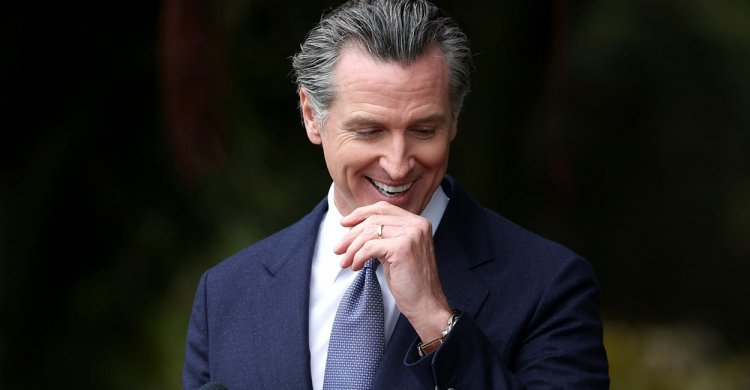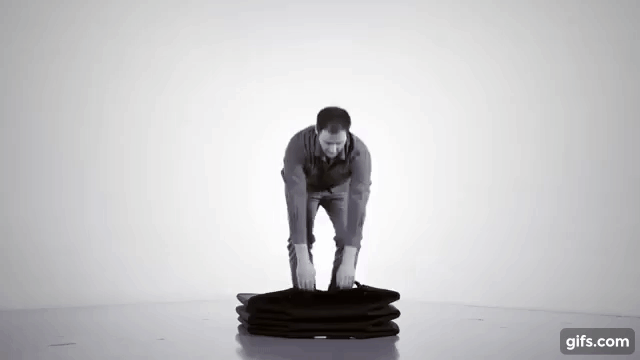Newsom’s Montana Vacation Stirs Scrutiny of California Travel Bans
California Gov. Gavin Newsom appeared caught off guard by a backlash against his vacation this week in Montana, one of 22 states subject to California’s... Read More The post Newsom’s Montana Vacation Stirs Scrutiny of California Travel Bans appeared first on The Daily Signal.

California Gov. Gavin Newsom appeared caught off guard by a backlash against his vacation this week in Montana, one of 22 states subject to California’s ban on official travel based on those states’ “discriminatory laws” against the LGBTQ community.
Newsom’s communications team quickly revved into gear after reports that the governor was spending his downtime in the Big Sky State, telling a number of reporters that the California prohibition only applies to state-paid travel, and this was a private family affair not subject to the ban.
By that time, though, the Democratic governor’s Montana holiday was already a viral Twitter flashpoint, with Republicans lampooning the move as an optics disaster that further cements Newsom’s reputation as an elitist politician with a double-standard problem.
“Does Montana have a French Laundry,” Jon Levine, a politics and culture reporter for the conservative New York Post, asked while needling the governor on Twitter. Levine was referring to another low moment in Newsom’s gubernatorial tenure when he was photographed eating out at the Michelin-rated three-star French Laundry restaurant after advising against social gatherings during the pandemic.
It didn’t help that Newsom launched a July 4-themed attack ad just days earlier against the red state of Florida and Gov. Ron DeSantis, a top GOP 2024 presidential contender, fueling speculation about his own White House ambitions.
For many conservatives, Newsom’s choice to spend his off hours in a red state that Donald Trump won by 16.4 percentage points in 2020 was easy fodder for ridicule. But the social media tempest the trip stirred is also drawing new scrutiny to California’s and other states’ rules designed to punish states that pass laws California and other liberal bastions deem harmful to the LGBTQ community.
At least six states and the District of Colombia over the last six years have prohibited their employees from taking work trips to states with laws that, in their view, discriminate against lesbian, gay, bisexual, and transgender people. California’s prohibition is by far the most sweeping, barring state-funded travel to nearly half the country: 22 states, including four additions—Arizona, Indiana, Louisiana, and Utah—last week.
California, Connecticut, Minnesota, New York, Vermont, Washington, and the District of Columbia all have sought to financially pressure several other states in some form or another—creating a confusing patchwork of bans, with some states lifting previous travel bans on other states, such as Indiana, that revise laws applying to the LGBTQ community after a national or statewide uproar.
This government-to-government retribution is reminiscent of the “cancel culture” that led Major League Baseball to move the All-Star Game from Atlanta to Denver in 2021, after Democrats retaliated against Georgia over new election laws passed by the state’s Republican legislature. But the bans on state-funded travel long predated that effort.
Boycotts have been a venerated tactic of labor groups and human rights activists for nearly 150 years and have been used against entities ranging from British slumlords in Ireland in the 1880s to the entire country of Rhodesia, which was the subject of a U.N.-led boycott in 1965 that eventually led to the collapse of its racist regime. Boycotts against businesses that discriminated against blacks were a staple of the civil rights movement in the 1950s and 1960s.
The first gay rights-themed boycott predated Florida’s “Don’t Say Gay” law by some 45 years, but it also took place in Florida. At that time, socially conservative evangelical pop star Anita Bryant was the spokeswoman for the Florida Citrus Commission. Bryant was also an outspoken political activist who organized successful anti-discrimination codes in cities ranging from Miami to Eugene, Oregon. In response, gay and lesbian organizations launched a boycott of Florida orange juice.
In so doing, a new element had been added to boycotts—targeting not just an industry, but a state as well.
In 1987, Arizona Gov. Evan Meacham rescinded a Martin Luther King holiday, even though President Reagan had signed legislation in 1983 making King’s birthday a federal holiday. After the issue was put to a state referendum in 1990—and it was defeated—the numerous conventions scheduled in Arizona were canceled in response, and the National Football League announced it was moving the 1993 Super Bowl out of Phoenix.
Two decades later, Arizona was in liberal crosshairs again, this time for a statute aimed at curbing illegal immigration—and which critics immediately derided as discriminatory. Again, conferences were targeted, and not only by private organizations.
The city of Los Angeles forbade state travel to its eastern neighbor, and other governmental entities followed suit. By the time Arizona’s notorious “show me your papers” law was vacated, the strategy of states boycotting other states had crystalized, mainly because it seemed to work. The liberal Center for American Progress estimated that the Arizona boycott had cost the local economy tens of millions of dollars in lost revenue.
New York and other states began passing bans on state-funded travel in 2015 as a way to lash out against Indiana and its then-Gov. Mike Pence for enacting the Religious Freedom Restoration Act. The law allowed Indiana businesses to refuse to serve same-sex couples and other members of the LGBTQ community based on religious grounds.
It was in place for just a week before Pence bowed to pressure and significantly revised the law after a national firestorm of controversy and several corporations began a boycott.
Indianapolis-based Angie’s List (now known as Angi) announced a hold on a $40 million expansion that would bring 1,000 new jobs to the state, and the CEO of Salesforce, a $4 billion software giant, revoked a deal expanding its presence there. GenCon LLC, a major gaming convention that meets annually in Indianapolis, also threatened to pull out, while NCAA President Mark Emmert expressed concerns about hosting Final Four games in the Hoosier state.
Connecticut, New York, and Washington quickly instituted bans on state-funded travel to Indiana, which they lifted when Pence signed a revised version of the law they said was more acceptable.
By that time, however, the controversy over Pence’s Religious Freedom Restoration law had cost Indianapolis nearly at least a dozen conventions with estimated revenue near $60 million.
“In the case of Indiana, the state [ban] pressure was equally as squeezing as the corporate muscle we felt flexing,” Chris Gahl of Visit Indy, the city’s convention and visitors bureau, told Stateline.org, a publication funded by Pew Charitable Trusts, in 2017. “In all 12 cases, it was fear that if they had booked Indianapolis, they were unsure if they could drive delegate attendance based on the perception that Indy was no longer welcoming … It’s not superficial—it has a real impact.”
After witnessing the impact on Indianapolis, several mayors of liberal cities, including New York, the District of Columbia, San Francisco, Seattle, Minneapolis, and others sprang into action. They announced bans on city-funded travel to North Carolina amid a national backlash over House Bill 2, which prevented transgender people in the state from using bathrooms aligned with their gender identity.
North Carolina lawmakers quickly devised a compromise that helped convince collegiate sporting events to return to the state. Still, several big-city mayors kept a ban on employees traveling there.
Rock star Bruce Springsteen canceled a concert in Greensboro, North Carolina, and more than 130 chief executives of corporations signed a letter to then-North Carolina Gov. Pat McCrory, urging that the law be repealed. Bank of America, which has its headquarters in Charlotte, signed on. An Associated Press analysis at the time estimated that HB2 would cost the state more than $3.76 billion in lost business over a dozen years.
Then-New York Gov. Andrew Cuomo enacted a ban against unnecessary government trips to the Tar Heel State. A week later, he expanded the prohibition to Mississippi after it passed a law allowing religious groups and some businesses to deny service to LGBTQ individuals and couples. New York, Vermont, Washington State, and the District of Columbia quickly followed suit.
Just a few months later, in the fall of 2016, then-California Gov. Jerry Brown, Newsom’s predecessor, joined the effort, signing a law severely limiting state-funded travel to North Carolina and any state “supporting or financing discrimination against lesbian, gay, bisexual and transgender people.”
Over the next two years, then-California Attorney General Xavier Becerra greatly expanded the list, adding Alabama, Iowa, Kansas, Mississippi, Kansas, Kentucky, South Dakota, Tennessee, and Texas to the list of places where state employee travel is restricted. Becerra had a reason for every state, he added. Iowa, for example, was blacklisted for barring the use of Medicaid funds for certain transgender surgical procedures.
California’s law originally included a few exemptions for some trips, such as travel needed to enforce California law and contracts made before 2017. It has since greatly increased the list of exemptions.
Early on, there were worries that the law could hurt college athletics at publicly funded California universities by barring scouts from recruiting from high schools caught up in the travel ban over several states, as well as restricting academic and scientific research collaboration with their counterparts in banned states such as Texas. The state has since issued waivers for athletes and others to attend events on the banned list.
There is little reciprocity or retribution from red states. California and other states enacting are happy to welcome government officials crossing their borders for lucrative conferences and events. But at least one targeted state has tried to strike back, albeit in a limited way. In 2018, Tennessee’s Senate and House speakers barred any state funds from going to lawmakers’ attendance at the National Conference of State Legislatures convention in San Diego that summer.
Tennessee’s top two leaders in the legislature at the time, Senate Speaker Randy McNally (who is now lieutenant governor) and House Speaker Beth Harwell, wrote a letter to NCSL executives laying out their reasoning.
“This is not an action we feel any pleasure taking,” they wrote. “It is California, not Tennessee [that] set this chain of events in motion. The pair noted that “the moment California rescinds its ban, Tennessee will begin approving travel to California. We hope that moment comes soon.”
Not surprisingly, it didn’t. California has since added 12 more states to the ban, including Montana last summer, over a law preventing transgender women and girls from participating in women and girls school sports. (San Francisco’s City Council has gone even further, prohibiting the city from doing business not just with states it finds wanting, but companies from those states.)
Has the tactic reached a point of diminishing returns? Some think so, as the contracting process in San Francisco has not only become cumbersome, but also added costs that must be borne by taxpayers.
At the statewide level, California hasn’t hesitated to expand its travel bans to punish purple states for passing legislation the LGBTQ community strongly opposes. Arizona, a swing state that fell into the Biden column by a slim, nearly 10,500-vote margin, was added to the blacklist last week.
Bonta said Arizona’s GOP lawmakers earned the rebuke for recently enacting laws prohibiting health care professionals from providing, and insurance companies from covering, “gender-affirming care for minors.” He also cited a law barring transgender women and girls from participating in intramural and interscholastic school sports.
Indiana, Louisiana, and Utah were added at the same time for their laws against transgender women and girls competing in women’s sports leagues.
No other state but California has such expansive travel bans, and now Newsom is discovering just how inconvenient they can be when planning vacations. His in-laws own a Montana ranch where he and his wife married in 2008. Supporters argue that avoiding visits to the state where his wife’s parents live is an overly onerous expectation.
“We are not in the business of regulating where people have family or where they spend their vacation,” Newsom spokeswoman Erin Mellon told RealClearPolitics. “Nor will we persecute them for visiting their family. The press shouldn’t either.”
Mellon would not comment on whether California state staffers, including a security detail, accompanied Newsom and his family to Montana, which could violate the prohibition on state-funded travel.
Ronald Kessler, the author of several books on the FBI and the CIA, said governors typically have security details consisting of at least five state troopers at a time, which could mean a total of a dozen or more for round-the-clock protection. Kessler also notes that Montana law enforcement resources are likely contributing to Newsom’s and his family’s protection while they’re in the state.
Gary Byrne, a 29-year veteran of law enforcement, including the Secret Service, said there could be just one California state police officer or trooper accompanying Newsom to Montana if he and his family had tried to keep their visit under the radar.
“They’ll usually coordinate with local law enforcement of whatever town they’re going into and in this case also with the Montana state police,” said Byrne, author of “Secrets of the Secret Service” and “Crisis of Character” about his experiences protecting President Bill Clinton.
While the extra protection would amount to an expense for Montana law enforcement, a potential violation of the Golden State’s travel ban would only occur if aides in Newsom’s office or California state police accompanied him. Newsom’s office would not say whether staffers and police escorted the Newsom family on vacation, nor whether the governor would personally have to reimburse the California treasury for state resources expended for the travel.
A provision of the California travel law, AB 1887, could help inoculate the governor against costs associated with a security detail. It provides an exemption to the travel ban for “the protection of public health, welfare, or safety, as determined by the affected agency, department, board, authority or commission, or by the affected legislative office.”
Bonta’s office responded to questions about the legality of Newsom bringing staff or security to Montana by referring RCP to Newsom’s office. “It’s ultimately up to each California agency to make determinations about the steps they’ll need to take to comply with [the law],” Bonta’s press office said in a statement.
Newsom’s spokeswoman was tight-lipped. “We do not comment on the governor’s detail due to security concerns nor am I going to give specifics about where he is staying due to security risks,” she said.
Originally published by RealClear Politics and distributed by RealClearWire.
Have an opinion about this article? To sound off, please email letters@DailySignal.com and we’ll consider publishing your edited remarks in our regular “We Hear You” feature. Remember to include the url or headline of the article plus your name and town and/or state.
The post Newsom’s Montana Vacation Stirs Scrutiny of California Travel Bans appeared first on The Daily Signal.
















